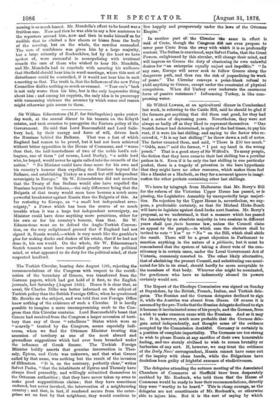Sir 'Wilfrid Lawson, at an agricultural dinner in..Cumberland last week,
in referring to the Cattle Bill, said-he should be-glad if the farmers got anything that did them real good, for they had had a series of depressing years. Nevertheless, they were not always so badly off as they liked to represent themselves. "One Scotch farmer had determined, in spite of the bad times, to parhis rent, if it were his last shilling, and saying to the factor who re- ceived it, "it is my last shilling !" he threw down a roll of notes. The factor counted them, and said, "There is 150 too much." "Odds, man !" said the farmer, "I put my hand in the wrong pouch." That is a good story of Sir Wilfrid's. To many people, the fiction that they have come to their last shilling has a peculiar pathos in it. Even if it be only the last shilling in one particular pocket, there is a tragedy of privation in the bare hypothesis that they-might have no other resource, which makes them feel like a Hamlet or a Macbeth, as they for a moment ignore in imagi- nation the other pockets containing other last shillings.






























 Previous page
Previous page